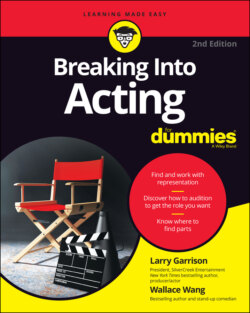Читать книгу Breaking into Acting For Dummies - Larry Garrison - Страница 78
Your acting experience and education
ОглавлениеInitially, you need to list every available acting experience you’ve ever had, just to fill up your resume. Eventually, as you gain more experience, you can selectively choose the more impressive roles and eliminate the less important or trivial ones, such as your bit role as a butler in a community theater or your appearance in a play put on by your college drama department.
Even if you have experience in television commercials, never list them on your resume. If your resume says that you once did a commercial for Hertz rental cars (even if it was ten years ago), another car rental company like Avis may be reluctant to hire you for its ad campaign. Instead of listing specific commercials, play it safe and just create a commercial section on your resume, saying, “Commercial list available on request.”
When listing your film, television, and theater experience, include the following four items for each role:
The name of the film, play, or television show you were in
The role you played
The type of role you played (lead role, featured role, supporting/guest role, or a recurring role)A lead role is considered a starring role.A featured role is a co-starring role, where you may have played a large role but weren’t necessarily the main character.A supporting/guest role is usually a small role where you had some acting and speaking parts (unlike an extra, who has no speaking roles whatsoever).On television shows, you may also have a recurring role, which means your character pops up from time to time in a few episodes of a regular show.
The studio name, television network, theater, or director you worked for
If you played a lead role, you may want to emphasize it on your resume. If you played a minor role but worked for a major director like Steven Spielberg, you may want to emphasize your work experience with him with the supporting role you played. If you appeared in a particularly prestigious Broadway theater, you may want to mention that theater name inclusive of the type of role you played. In general, include whatever looks most impressive. Again, your agent (or someone else knowledgeable in the industry) can give you additional advice on what to highlight.
Under your theater credits, be sure to identify any roles where you were an understudy rather than the principle performer. Nobody will fault you for being an understudy, but people may get upset if your resume gives the impression that you played a major role when you really didn’t.
Be sure to include information about your college education if your degree is in an acting or performance-related field such as drama, broadcasting, or public speaking. If you didn’t major in an acting-related field, don’t bother listing your college history because no one cares if you graduated from Harvard or Yale in engineering or English literature. An education in acting shows that you’ve studied acting, but actual working experience beats education every time.
